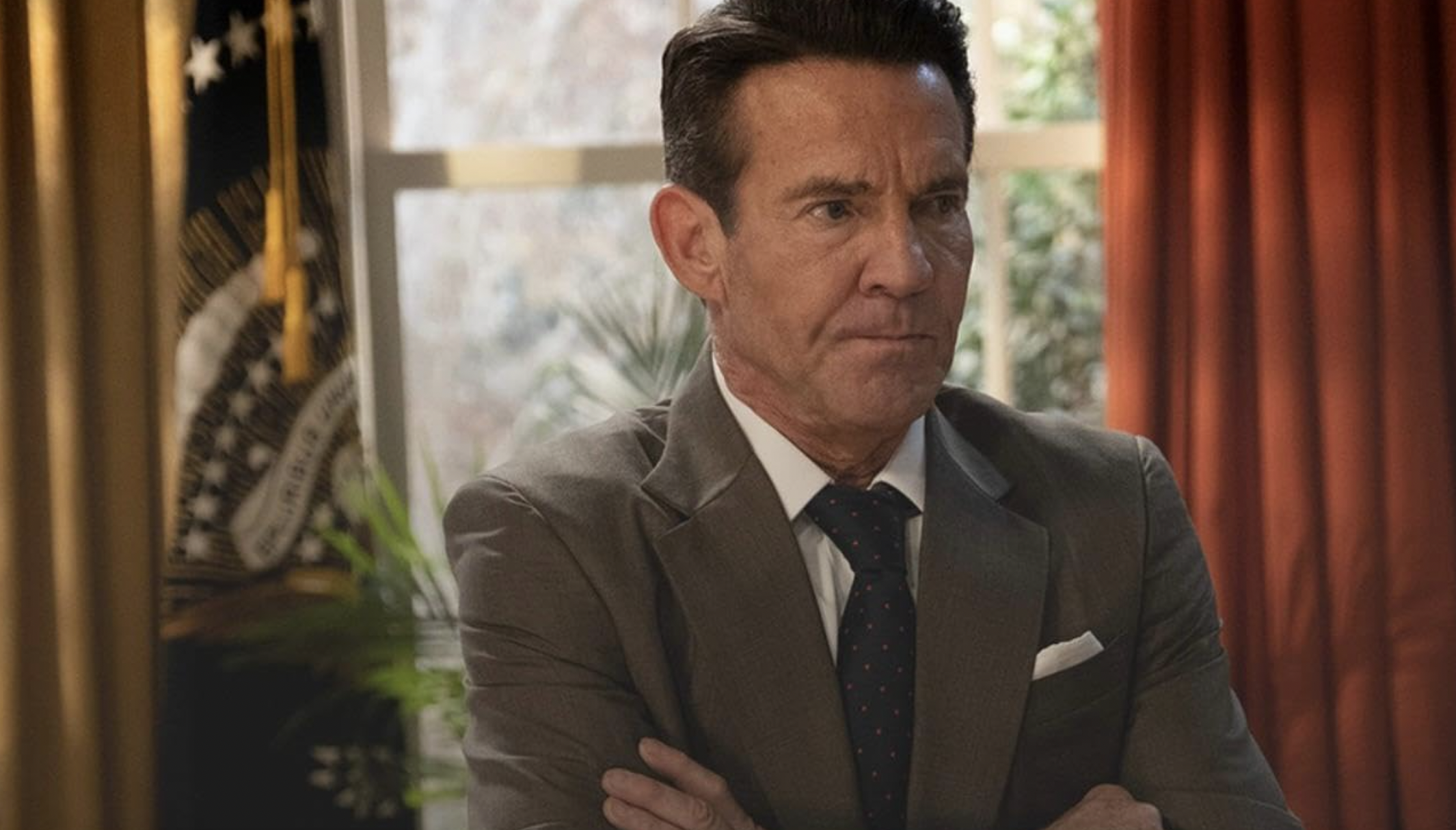The trouble with biopics is that they tend to reduce the messy, complex lives of public figures to easily digestible kitsch. But that’s hardly a problem with Ronald Reagan, who already understood the story of his life in strictly kitsch terms. The dime store novels he read as a child, the self-help Calvinism that somehow always directed him to do what he already wanted to, the B-movies in which he starred—all told Reagan he was a hero for whom his god had a plan. Who was he to doubt them?
Reagan is directed by onetime Disney/Nick producer Sean McNamara, produced by Christian-media cash-wrangler Mark Joseph, and adapted from Paul Kangor’s 2006 book The Crusader: Ronald Reagan and the Fall of Communism. But the Gipper could have dreamt it up himself. In the title role, Dennis Quaid strides inexorably toward destiny, his adoring and stylish wife Nancy (Penelope Ann Miller) ever by his side, his foes consistently flabbergasted by how he outwits them. It’s a bit like the old SNL skit where Phil Hartman plays Ronnie as a shrewd mastermind who only pretends to be a bumbling nice guy in public, except Reagan only uses his power for good.
Before I go any further: No one should see Reagan. I’m not joking. No, really—I’m worried that if I make any jokes here you’ll think maybe Reagan is bad in a fun way, or in a way that’s at least instructive about modern conservatism. It’s bad in a mildly stupefying way, leaving you with fewer thoughts about Reagan than you had before you entered the theater, drifting along from event to event with the pacing and depth of a History Channel historical reenactment.
Young Dutch Reagan stands up to bullies at his mother’s urging. Lifeguard Reagan rescues cuties who pretend to drown so they can be caught up in his manly arms. Screen Actors Guild VP Reagan fights off union commies and testifies bravely before the House Un-American Activities Committee. Gov. Reagan calls in the National Guard to deal with campus protestors.
Of course, there are setbacks as well: the indignity of selling products on TV, the convention loss to Ford in ’76, John Hinckley. But finally, as the Lord hath ordained, President Reagan achieves his dream of saying “nyet” to the Soviets.
Scotch-taping these scenes together is a truly spirit-sapping framing device. A young cabinet member who is rumored to be Putin’s successor meets with an old KGB hand because he wants to learn “why we failed.” (Both characters are pure inventions.) The aging spy is played by reactionary crank Jon Voight, who also, during flashbacks, appears in comically bad young-age makeup, looking like an undercover agent who wants to get caught. For four decades he tries to warn oblivious higher-ups that Reagan (code name: The Crusader) is a danger to their way of life. But no one listens! No one ever listens!
As Voight guides us by the hand through this simple plot, Quaid struggles to reconcile the Reagan that we all experienced with the dynamic character the film calls for. (Also, despite gobs of face putty, he sometimes looks more like Fred McMurray.) Quaid’s got the affably wavering voice down, but there’s something too intense and active about his eyes. Reagan was a creature of television. He wasn’t charismatic; he was comfortable. (One of the great paradoxes of the ’80s is how many Americans took solace from a man who said the most incendiary things.) His twinkling peepers never made demands of you, and he spoke with the carefully modulated calm of a committed ideologue disguised as a trustworthy spokesman.
Reagan also looks like shit. A low-budget endeavor dependent on green screen whenever the story calls for a location other than Oklahoma-playing-California, it’s glitchy with digital touch ups and school play-level makeup jobs. Even if Reagan had been capable of suspending your disbelief, seeing Kevin Dillon made up as Jack Warner or C. Thomas Howell as Caspar Weinberger or Robert Davi as Brezhnev would yank you right back to reality. The impersonations are often inept as well: Lesley-Anne Down is particularly dreadful as Thatcher. And somebody must have owed a favor to Creed’s Scott Stapp, who makes a blink-and-he’s-gone appearance as the most un-Frank-like Sinatra ever, belting “Swinging on a Star” in the ’40s.
As for the rest of the cast… well (as Reagan would say), some of the running time you can distract yourself with a game of “wingnut or broke”—is this actor a rabid conservative or just desperate for work? Most, like Mound, Minnesota’s own Kevin Sorbo, who shows up early in the film as the minister who baptizes young Dutch, fall into both categories. But are Mena Suvari (who plays Reagan’s first, insufficiently doting wife Jane Wyman) and Penelope Ann Miller (whose Nancy begins as a somewhat ditzy ingénue and matures into a selfless helpmeet without quite hardening into the shrewd power player that we know she was) really closet right-wingers or are times that tough for actresses?
Director McNamara is, quite simply, a hack. He fumbles potentially exciting moments like the 1981 assassination attempt, with which the film opens, and reduces Hollywood Black Friday, the bloody 1945 strike-turned-riot at the gates of Warners, to little more than a hallway scuffle. It’s like he just wants to get each scene over with so he can move on to the next. I get it—so did I.
But you don’t turn to the mind behind Even Stevens, the guy who made the fifth Bring It On film, the fourth 3 Ninjas movie, two Casper sequels, Legally Blondes (read carefully), and Soul Surfer, a crypto-Christian movie my niece was briefly obsessed with about a young woman whose arm was chomped off by a shark, for hard-hitting drama.
In other words, he’s just the right guy for the job.
The film has unshakable faith in Reagan’s words to alter reality. Each time he appears on television, we see “ordinary Americans”—barbers, restaurant workers, bar patrons—halted by his voice and drawn to his message. When the 73-year-old prez is dogged by concerns about his age before the 1984 election, he simply jokes during a debate that he won’t “make age an issue of this campaign” by bringing up Walter Mondale’s “youth and inexperience” and wins in a landslide. Never mind that Reagan was already 11 points ahead in the polls. When his administration is caught illegally funding the Nicaraguan Contras, Reagan ends impeachment threats with a repentant TV address, though in fact the Democrats simply decided that ousting a lame duck with less than 18 months to go was more trouble than it was worth.
Reagan even climaxes with a speech, its hero’s defiant cry to “tear down this wall!” given at the Brandenburg Gate in Berlin in 1987. Dewy eyed Germans in the crowd glimpse the coming freedom of their eastern compatriots. In perhaps the most embarrassing moment in a wholly embarrassing two hours, Thatcher, watching on TV, exclaims, “Well done, cowboy!” Gorbachev and his minions cower in defeat, realizing they have once more underestimated The Crusader and must return to the negotiating table in shame.
You won’t see that there had been a demonstration of 50,000 West Germans against Reagan the day before the speech, or that whole sections of Berlin were shut down to prevent further protest. You won’t hear about the East Germans activists whose work led to the fall of the GDR and reunification. And as for Gorby’s stunned reaction to a demand that Reagan had in fact made (in less pithy forms) publicly in the past, we only have the word of speechwriter Dana Rohrabacher. His claim that military intelligence learned that the Soviet response was, “If he’s talking about this wall, he’s never going to let go unless we do something” is uncorroborated. (A more likely, if still generous reading of the line’s importance is that it gave Reagan the cover with hard-liners he needed while he continued to work toward the INF Treaty.)
And yet Reagan makes this sort of fact-checking feel even more tedious than usual. I even have a hard time complaining about a truly weird montage, supposedly set before the 1984 election, that mixes Genesis’s Reagan-mocking “Land of Confusion” music video and scenes of ACT UP protesting Reagan’s silence on AIDS—all footage that dates from well into Reagan’s second term—with what appear to be clips of the Solid Gold dancers.
Reagan is clearly not history, but it’s not really entertainment either. It’s barely a movie, and even to call it propaganda suggests a manipulative skillfulness it lacks. Reagan is more like a two-hour bedtime story, meant, like the man himself, to reassure those frightened by history. The handful of (mostly) 60-and-above (presumably) conservative audience members at the AMC Southdale with me on Labor Day chuckled at the familiar lines. “I hope you’re all Republicans.” “I didn’t leave the Democratic Party, the party left me.” “There you go again.” Reagan strips away the paranoia and apocalyptic terror of the Cold War (not to mention almost all domestic policy) and leaves simplicity: We knew who was out to get us, and we got them first.
After all, the MAGA masses may shout “COMMUNISM!” at the hint of every new social program, but what can that word mean to anyone born after the wall came down? China doesn’t truly spook Americans as the Soviets once did, so new adversaries are targeted with scattershot desperation: the immigrants, the Arabs, the Blacks, the wokes, trans athletes, women who laugh. I suspect that Trumpinistas are nostalgic for a time when they could be certain that the United States knew it was an agent of good because it had an acknowledged enemy.
So what is Reagan’s real legacy? Let’s return to Dana Rohrabacher. After the wall went down in 1989, Rohrabacher was among the Reaganauts who began tirelessly overstating the significance of the 1987 Brandenburg speech, as though the president had intoned some sort of Iron Curtain abracadabra. Curiously, Rohrabacher (who didn’t even write the damn line) plays an outsized role in Reagan. We meet longtime advisors Ed Meese and Mike Deaver in passing; Rohrabacher gets not one but two colorful introductions.
But despite the claims of capitalist triumphalists, history did not end in 1989, and Rohrabacher’s biography only really gets interesting after he leaves the White House. With Oliver North campaigning for him, he wins a House seat in Orange County, California, that he holds for 30 years, despite a 1995 conviction for election fraud. As the FBI warns that the Russians are trying to recruit him as an “agent of influence,” he cozies up to Putin. Trump shortlists him for Secretary of State. In 2018 he loses the most expensive House race that cycle to a Bloomberg-backed Democrat. On January 6, 2021, he’s filmed busting through a U.S. Capitol Police barricade. No charges are filed. Like most of the Iran-Contra plotters, he just walked away.
And that's just one minor strand that connects the age of Reagan to our own. Working with the Federalist Society, Ed Meese, Reagan’s crooked attorney general, groomed the crop of young conservative judges who would eventually dominate the U.S. Supreme Court; for his efforts, Trump awarded Meese the Presidential Medal of Freedom. The dissolution of the USSR led to an orgy of free market excess that allowed oligarchs to seize the region’s wealth and opened a power vacuum in Russia for Putin to fill. The Mujahideen that Reagan armed against the Soviets in Afghanistan would later become the Taliban. The partnership between evangelicals and the Republican Party that Reagan brokered furthers a white Christian supremacist agenda daily. And I could go on…
This is still Reagan’s world. He broke it, and we bought it.
GRADE: D+
Reagan is now showing in area theaters.






